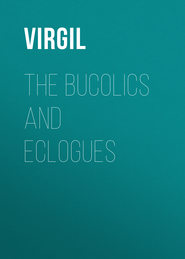По всем вопросам обращайтесь на: info@litportal.ru
(©) 2003-2025.
✖
The Georgics
Настройки чтения
Размер шрифта
Высота строк
Поля
Nor thee must I pass over, vine of Rhodes,
Welcomed by gods and at the second board,
Nor thee, Bumastus, with plump clusters swollen.
But lo! how many kinds, and what their names,
There is no telling, nor doth it boot to tell;
Who lists to know it, he too would list to learn
How many sand-grains are by Zephyr tossed
On Libya's plain, or wot, when Eurus falls
With fury on the ships, how many waves
Come rolling shoreward from the Ionian sea.
Not that all soils can all things bear alike.
Willows by water-courses have their birth,
Alders in miry fens; on rocky heights
The barren mountain-ashes; on the shore
Myrtles throng gayest; Bacchus, lastly, loves
The bare hillside, and yews the north wind's chill.
Mark too the earth by outland tillers tamed,
And Eastern homes of Arabs, and tattooed
Geloni; to all trees their native lands
Allotted are; no clime but India bears
Black ebony; the branch of frankincense
Is Saba's sons' alone; why tell to thee
Of balsams oozing from the perfumed wood,
Or berries of acanthus ever green?
Of Aethiop forests hoar with downy wool,
Or how the Seres comb from off the leaves
Their silky fleece? Of groves which India bears,
Ocean's near neighbour, earth's remotest nook,
Where not an arrow-shot can cleave the air
Above their tree-tops? yet no laggards they,
When girded with the quiver! Media yields
The bitter juices and slow-lingering taste
Of the blest citron-fruit, than which no aid
Comes timelier, when fierce step-dames drug the cup
With simples mixed and spells of baneful power,
To drive the deadly poison from the limbs.
Large the tree's self in semblance like a bay,
And, showered it not a different scent abroad,
A bay it had been; for no wind of heaven
Its foliage falls; the flower, none faster, clings;
With it the Medes for sweetness lave the lips,
And ease the panting breathlessness of age.
But no, not Mede-land with its wealth of woods,
Nor Ganges fair, and Hermus thick with gold,
Can match the praise of Italy; nor Ind,
Nor Bactria, nor Panchaia, one wide tract
Of incense-teeming sand. Here never bulls
With nostrils snorting fire upturned the sod
Sown with the monstrous dragon's teeth, nor crop
Of warriors bristled thick with lance and helm;
But heavy harvests and the Massic juice
Of Bacchus fill its borders, overspread
With fruitful flocks and olives. Hence arose
The war-horse stepping proudly o'er the plain;
Hence thy white flocks, Clitumnus, and the bull,
Of victims mightiest, which full oft have led,
Bathed in thy sacred stream, the triumph-pomp
Of Romans to the temples of the gods.
Here blooms perpetual spring, and summer here
In months that are not summer's; twice teem the flocks;
Twice doth the tree yield service of her fruit.
But ravening tigers come not nigh, nor breed
Of savage lion, nor aconite betrays
Its hapless gatherers, nor with sweep so vast
Doth the scaled serpent trail his endless coils
Along the ground, or wreathe him into spires.
Mark too her cities, so many and so proud,
Of mighty toil the achievement, town on town
Up rugged precipices heaved and reared,
And rivers undergliding ancient walls.
Or should I celebrate the sea that laves
Her upper shores and lower? or those broad lakes?
Thee, Larius, greatest and, Benacus, thee
With billowy uproar surging like the main?
Or sing her harbours, and the barrier cast
Athwart the Lucrine, and how ocean chafes
With mighty bellowings, where the Julian wave
Echoes the thunder of his rout, and through
Avernian inlets pours the Tuscan tide?
A land no less that in her veins displays
Rivers of silver, mines of copper ore,
Ay, and with gold hath flowed abundantly.
A land that reared a valiant breed of men,
The Marsi and Sabellian youth, and, schooled
To hardship, the Ligurian, and with these
The Volscian javelin-armed, the Decii too,
The Marii and Camilli, names of might,
The Scipios, stubborn warriors, ay, and thee,
Great Caesar, who in Asia's utmost bounds
With conquering arm e'en now art fending far
The unwarlike Indian from the heights of Rome.
Hail! land of Saturn, mighty mother thou
Of fruits and heroes; 'tis for thee I dare
Unseal the sacred fountains, and essay
Themes of old art and glory, as I sing
The song of Ascra through the towns of Rome.
Now for the native gifts of various soils,
What powers hath each, what hue, what natural bent
For yielding increase. First your stubborn lands
And churlish hill-sides, where are thorny fields
Welcomed by gods and at the second board,
Nor thee, Bumastus, with plump clusters swollen.
But lo! how many kinds, and what their names,
There is no telling, nor doth it boot to tell;
Who lists to know it, he too would list to learn
How many sand-grains are by Zephyr tossed
On Libya's plain, or wot, when Eurus falls
With fury on the ships, how many waves
Come rolling shoreward from the Ionian sea.
Not that all soils can all things bear alike.
Willows by water-courses have their birth,
Alders in miry fens; on rocky heights
The barren mountain-ashes; on the shore
Myrtles throng gayest; Bacchus, lastly, loves
The bare hillside, and yews the north wind's chill.
Mark too the earth by outland tillers tamed,
And Eastern homes of Arabs, and tattooed
Geloni; to all trees their native lands
Allotted are; no clime but India bears
Black ebony; the branch of frankincense
Is Saba's sons' alone; why tell to thee
Of balsams oozing from the perfumed wood,
Or berries of acanthus ever green?
Of Aethiop forests hoar with downy wool,
Or how the Seres comb from off the leaves
Their silky fleece? Of groves which India bears,
Ocean's near neighbour, earth's remotest nook,
Where not an arrow-shot can cleave the air
Above their tree-tops? yet no laggards they,
When girded with the quiver! Media yields
The bitter juices and slow-lingering taste
Of the blest citron-fruit, than which no aid
Comes timelier, when fierce step-dames drug the cup
With simples mixed and spells of baneful power,
To drive the deadly poison from the limbs.
Large the tree's self in semblance like a bay,
And, showered it not a different scent abroad,
A bay it had been; for no wind of heaven
Its foliage falls; the flower, none faster, clings;
With it the Medes for sweetness lave the lips,
And ease the panting breathlessness of age.
But no, not Mede-land with its wealth of woods,
Nor Ganges fair, and Hermus thick with gold,
Can match the praise of Italy; nor Ind,
Nor Bactria, nor Panchaia, one wide tract
Of incense-teeming sand. Here never bulls
With nostrils snorting fire upturned the sod
Sown with the monstrous dragon's teeth, nor crop
Of warriors bristled thick with lance and helm;
But heavy harvests and the Massic juice
Of Bacchus fill its borders, overspread
With fruitful flocks and olives. Hence arose
The war-horse stepping proudly o'er the plain;
Hence thy white flocks, Clitumnus, and the bull,
Of victims mightiest, which full oft have led,
Bathed in thy sacred stream, the triumph-pomp
Of Romans to the temples of the gods.
Here blooms perpetual spring, and summer here
In months that are not summer's; twice teem the flocks;
Twice doth the tree yield service of her fruit.
But ravening tigers come not nigh, nor breed
Of savage lion, nor aconite betrays
Its hapless gatherers, nor with sweep so vast
Doth the scaled serpent trail his endless coils
Along the ground, or wreathe him into spires.
Mark too her cities, so many and so proud,
Of mighty toil the achievement, town on town
Up rugged precipices heaved and reared,
And rivers undergliding ancient walls.
Or should I celebrate the sea that laves
Her upper shores and lower? or those broad lakes?
Thee, Larius, greatest and, Benacus, thee
With billowy uproar surging like the main?
Or sing her harbours, and the barrier cast
Athwart the Lucrine, and how ocean chafes
With mighty bellowings, where the Julian wave
Echoes the thunder of his rout, and through
Avernian inlets pours the Tuscan tide?
A land no less that in her veins displays
Rivers of silver, mines of copper ore,
Ay, and with gold hath flowed abundantly.
A land that reared a valiant breed of men,
The Marsi and Sabellian youth, and, schooled
To hardship, the Ligurian, and with these
The Volscian javelin-armed, the Decii too,
The Marii and Camilli, names of might,
The Scipios, stubborn warriors, ay, and thee,
Great Caesar, who in Asia's utmost bounds
With conquering arm e'en now art fending far
The unwarlike Indian from the heights of Rome.
Hail! land of Saturn, mighty mother thou
Of fruits and heroes; 'tis for thee I dare
Unseal the sacred fountains, and essay
Themes of old art and glory, as I sing
The song of Ascra through the towns of Rome.
Now for the native gifts of various soils,
What powers hath each, what hue, what natural bent
For yielding increase. First your stubborn lands
And churlish hill-sides, where are thorny fields











